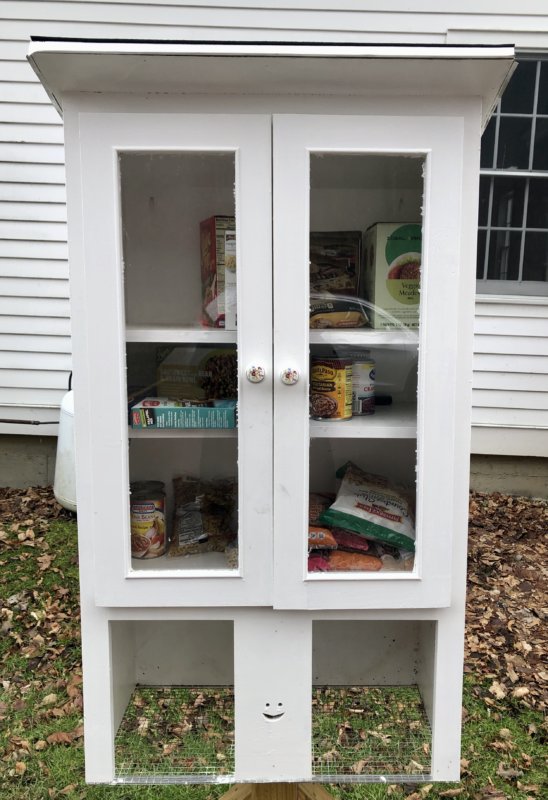Little Free Pantry plugs food insecurity gap
Most people are familiar with community food shelves. They are reliable sources of food on specific distribution days and often of temporary assistance with heating or other monthly bills, available free to those in need. They are underwritten by the local community with donations of foodstuffs and cash.
Tragically, the need for hunger relief is great, and in response, an additional community-supported food program has emerged called Little Free Pantries. Many communities across the U.S. have them, including Charlotte and several neighboring towns. Cute name, but what is that?

The Charlotte Little Free Pantry is behind the Charlotte Congregational Church.
A Little Free Pantry is literally a small food pantry — an accessible, modest-sized cabinet created and stocked by community members with mostly non-perishable food and open all day every day for whoever wants to add or take things. The simple instructions on the cabinet are usually: “Take what you need. Give what you can.”
These mini-pantries are part of a national grassroots movement to give individuals and communities a way to do something direct and immediate to help relieve food insecurity in their area. The pantries quickly provide nourishing food to those who need it and nourish the community by creating ways to help each other.
They do not replace food shelves or government-funded nutrition programs. They build on and complement them. An estimated 30 percent of those experiencing food insecurity in the U.S. today do not qualify for federal nutrition programs. Even though local food shelves can be more flexible with rules about who can participate and how, the need for hunger relief today is still much greater than these formal programs can address.
The beauty of a Little Free Pantry is its simplicity and ease of use. It may be sponsored by a church, a community organization or even a neighborhood. Food can be restocked routinely in an organized way by the sponsors or randomly and anonymously by those who can. People who use the pantry do not need to apply in advance or qualify in any way, so their use is private. They can draw on the pantry as often as they need to, whether that is regularly or only occasionally.
Trust is a core value of this system — trust that users will take only what they need, trust that donors will do their best to keep the shelves stocked and trust that the community will respect the physical pantry and protect it from damage or vandalism. The national website littlefreepantry.org provides helpful guidelines.
Churches or food shelves are the most common sponsors of Little Free Pantries, taking responsibility for creating a weatherproof cabinet, then finding ways to keep it stocked. How they do this is up to them. There are at least 20 Little Free Pantries in Vermont, with the first started by the United Church of Hinesburg in 2017. Charlotte Congregational Church opened one in 2022.
Hinesburg and Charlotte use different approaches to manage their Little Free Pantries, but both are dependent on the involvement and generosity of their communities. Hinesburg has a sophisticated system for handling the high volume of food they soon realized they needed. And Hinesburg fundraises as a team of volunteers spends about $1,000 a month to supplement food donations.
Charlotte Congregational Church sees its Little Free Pantry as a common responsibility shared among all those wishing it to succeed. Instead of a designated coordinator or volunteers assigned to check and replenish, it operates on the looser system of motivating the congregation and other community members to monitor and attend to the pantry’s needs as they can. Apparently, food flies out the pantry door and needs replenishing two to three times a week. The Charlotte Food Shelf shares whenever it has extra, but the system relies on Charlotters turning their concern and generosity into meaningful acts — either in food or money.
Charlotte is a wealthy town. Nevertheless, we still have neighbors who face food insecurity. This is a disturbing picture. The complicated issues behind hunger won’t be quickly sorted out, but in the meantime, we have a Little Free Pantry offering a way to help, one which is immediate. It funnels the desire of many people to share some of their abundance with their neighbors in need.
Remember that the pantry complements but doesn’t replace our food shelf, which also runs on community support. Don’t stop contributing money and food to the food shelf, but please also consider investing in the Little Free Pantry. Think in terms of healthy foods with a long shelf life and toiletries which can tolerate freezing temperatures (no cans or glass jars since they might break). Financial donations can be sent to the church marked in support of Little Free Pantry.
Questions can be directed to Hadley Abernathy Bunting through the Congregational Church office at 802-425-3176.
Thank you for whatever help you can give!
(Linda Hamilton lives in East Charlotte and is a member of Charlotte Grange.)
